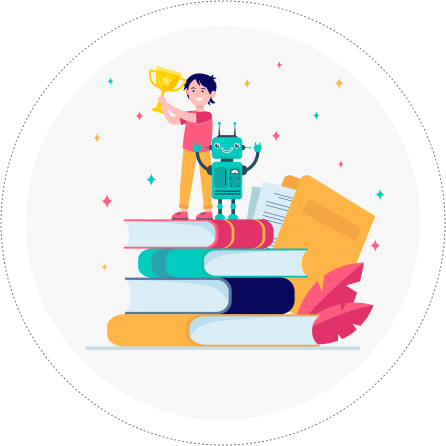Python Full Stack Web Development
- Home
- / Python Handay
- / Python Full Stack Web Development
Python Full Stack Web Development
Python Full Stack Web Development involves building both the front-end and back-end of web applications using Python as the primary language. Developers work with front-end technologies like HTML, CSS, JavaScript, and frameworks like React or Angular, and back-end technologies such as Django or Flask. It covers database management, server-side scripting, API integration, and deployment to deliver complete, scalable web solutions.
Prerequisites
The prerequisites for Python Full Stack Web Development are minimal, requiring only basic computer skills and internet proficiency. A genuine interest in learning and exploring web technologies is beneficial for success in this field.
Learning Objectives
The learning objectives of Python Full Stack Web Development include acquiring skills to build interactive front-end interfaces using HTML, CSS, and JavaScript, along with proficiency in Python frameworks like Django and Flask for back-end development. Students will also learn about database management, API integration, and deploying scalable web applications effectively.
Course Overview
Module 1: Frontend Development
- Introduction to HTML5
- Structuring web pages with semantic tags
- CSS styling techniques and responsive design
- Introduction to CSS frameworks (e.g., Bootstrap)
- Basics of JavaScript and ES6+ features
- DOM manipulation and event handling
- Introduction to AJAX for asynchronous requests
- Introduction to React and JSX
- Components, Props, and State Management
- Handling Events and Conditional Rendering
- React Router for Navigation
- Introduction to Hooks (useState, useEffect)
- Working with Forms and Formik
- Context API for State Management
Module 2: Backend Development (Python)
Python Fundamentals
Overview, PVM, Installation, IDEs, First Program, I/O, Tokens, Variables, Statements, Comments.
Data Types & Operators
Data Types, Type Casting, Operators, Expressions, Precedence.
Flow Control Statements
Conditional (if, else, elif), Loops (for, while), Control (break, continue, pass).
String Handling
Strings, Indexing, Slicing, Methods, Regular Expressions.
List Handling
Lists, Indexing, Slicing, Methods, Nested Lists, Comprehensions.
Tuple, Set Handling
Tuples, Sets : Creation, Indexing, Methods.
Dictionary Handling
Dictionaries: Access, Methods, Ordered Dicts.
Functions, Modules, and Packages
Defining Functions, Parameters, Lambdas, Modules, Recursion.
Object-Oriented Programming
Classes, Objects, Constructors, Inheritance, Method Overriding, MRO, Access Modifiers.
Exception Handling
try, except, Custom Exceptions, Assertions.
Data File Handling
File Operations, Text/Binary, pickle, csv, Random Access.
Database Connectivity
Connect, CRUD Operations, Python with MySql/MongoDB.
Introduction to Django
Overview, installation, and project setup.
Django Basics
Understanding apps, views, and URLs.
Models and Databases
Creating models, migrations, and database interactions.
Templates
Template creation, rendering, and context.
Forms
Handling forms, validation, and processing.
Static Files
Managing CSS, JavaScript, and images.
User Authentication
Implementing user registration, login, and permissions.
Admin Interface
Customizing the Django admin panel.
RESTful APIs
Building APIs with Django REST framework.
Deployment
Deploying Django applications on platforms like Heroku or AWS.
Advanced Topics
Middleware, signals, and caching.
- Introduction to React and JSX
- Components, Props, and State Management
- Handling Events and Conditional Rendering
- React Router for Navigation
- Introduction to Hooks (useState, useEffect)
- Working with Forms and Formik
- Context API for State Management
Module 3: Database Management
- Introduction to relational databases and SQL
- Writing SQL queries (SELECT, INSERT, UPDATE, DELETE)
Database normalization and relationships
- Introduction to SQLAlchemy for Flask applications
Using Django ORM for database interactions
- Introduction to React and JSX
- Components, Props, and State Management
- Handling Events and Conditional Rendering
- React Router for Navigation
- Introduction to Hooks (useState, useEffect)
- Working with Forms and Formik
- Context API for State Management
Module 4: API Development
- REST principles and HTTP methods
- Building APIs using Flask or Django
- Consuming APIs with JavaScript (fetch/Axios)
- Authentication and authorization (JWT, OAuth2)
- Best practices for securing APIs
Module 5: Deployment and DevOps
- Introduction to Docker and containerization
- Creating Docker images and containers
- Docker Compose for multi-container applications
- Deploying applications on cloud platforms (Heroku, AWS)
- Setting up CI/CD pipelines using GitHub Actions or Travis CI
Enquiry Now
Our Courses
Data Analyst using Python
Select Tech MindGuru for Why ?
Placement Assistance
Placement assistance offered for a successful career.
Membership
Membership provided until the final examination.
Personalized Attention
Personalized attention provided to each student.

Get Course Certificate
Certificate awarded upon completion of the course.
Monthly Tests
Regular monthly test series for progress evaluation.
Latest CBSE Syllabus
Training modules aligned with the latest CBSE syllabus.
Frequently Asked Questions
Typically, the course lasts between 5 to 6 months.
Entry-level positions may offer salaries ranging from $60,000 to $80,000 annually, with potential increases as experience grows.
No prior experience is required, but basic programming knowledge is beneficial.
Graduates can work as Full Stack Developers, Web Developers, or Software Engineers in various industries.
Skills include front-end and back-end development, database management, API integration, and deployment.
Yes, various online platforms offer certifications upon course completion, enhancing job prospects.
Yes, the demand for Full Stack Developers is high, making it a lucrative career option.
You’ll work with HTML, CSS, JavaScript, Python, Django, Flask, and databases like MySQL or PostgreSQL.
Yes, many companies offer remote work opportunities for Full Stack Developers, providing flexibility.


